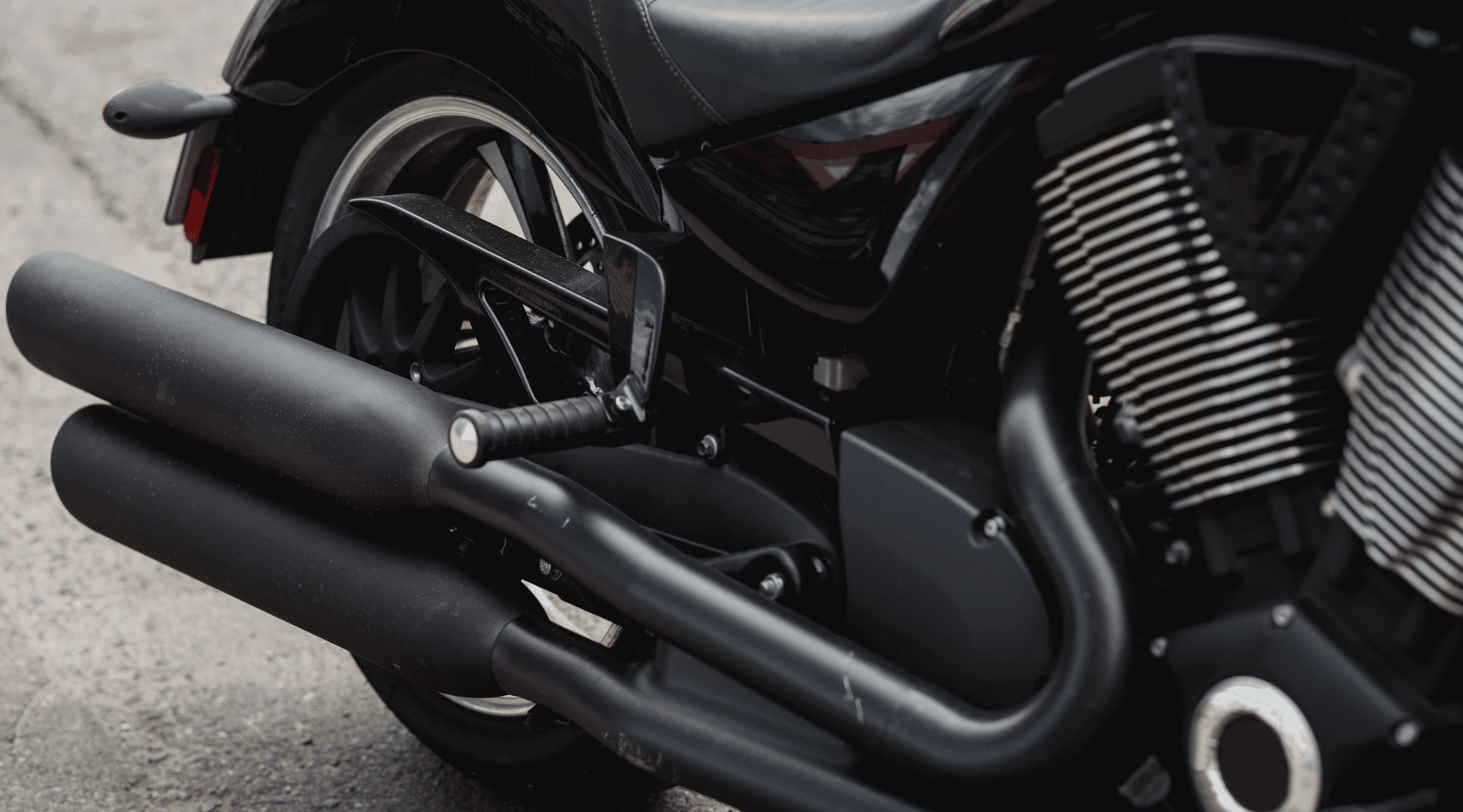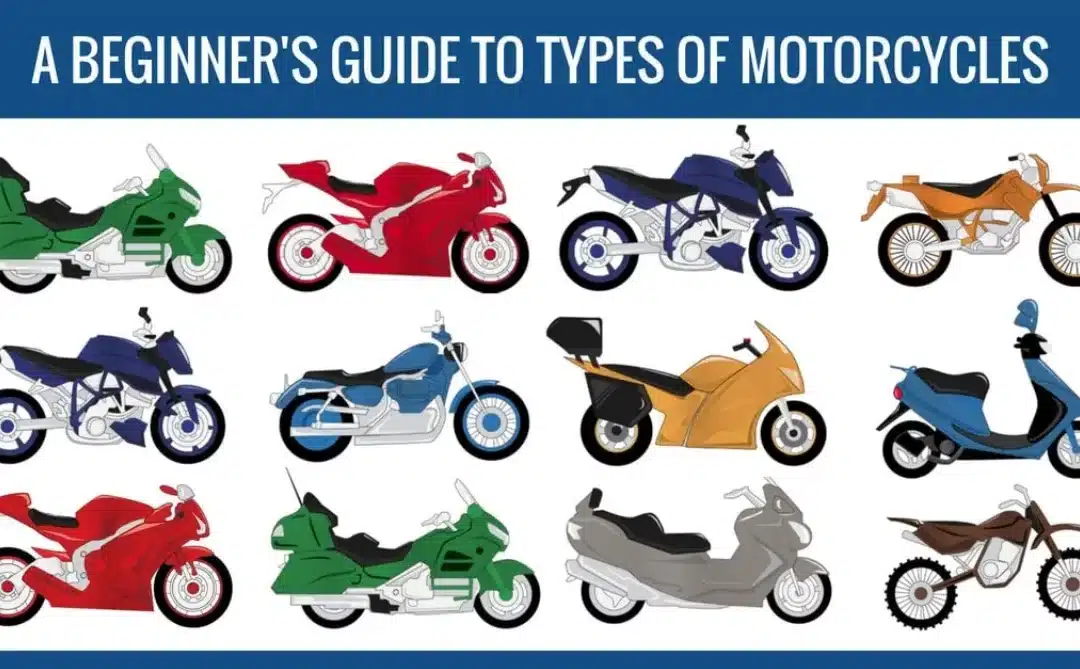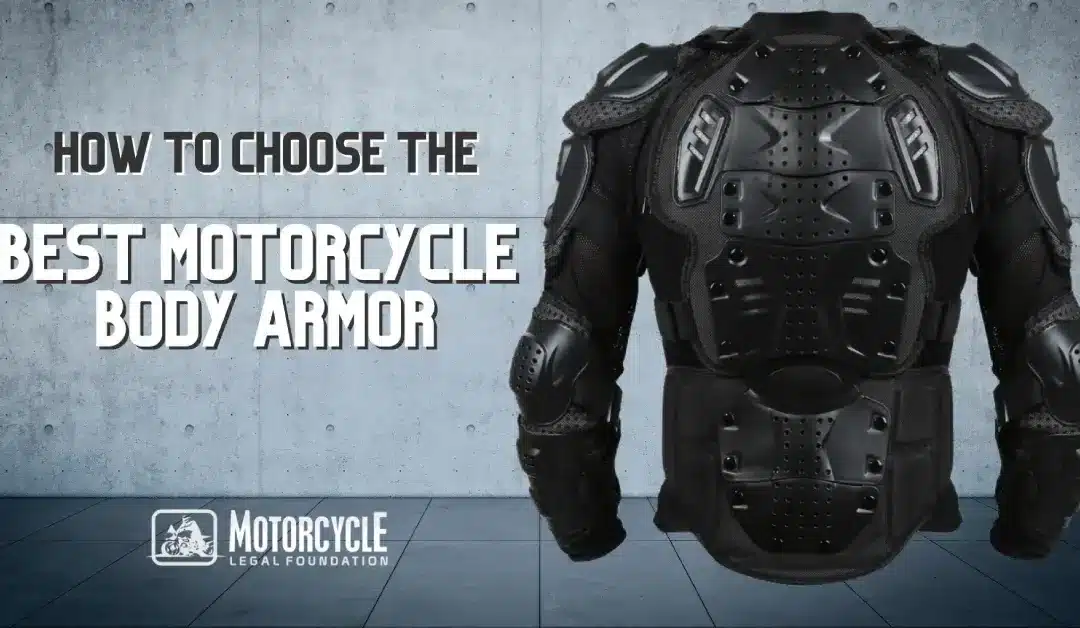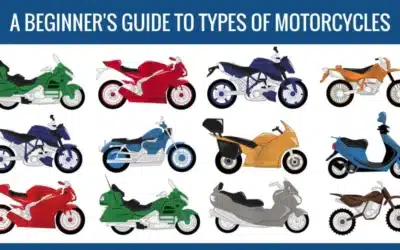Of the more than 8.6 million motorcycles registered in the United States, a popular modification undertaken by owners is to the exhaust system. Surveys show that 38% of motorcycles on the road have a replacement or modified exhaust systems. One estimate is that 85% of the owners of late-model motorcycles in Southern California either replaced or modified the stock exhaust systems on their bikes.
Straight piping is a popular modification for motorcycle enthusiasts who want a louder, more robust-sounding motorcycle than they get from the stock exhaust that came with their bike. One report claims that 60% to 70% of newer cruisers had their exhausts modified by their owners, but it’s not only cruisers that are being modified.
Exhaust systems on all makes and models of motorcycles can be modified or replaced. Just because it can be done may not mean straight piping or replacing the exhaust is something you want to do on your bike. To help you decide, we’ll look at what’s entailed and what harm, if any, will result from putting straight pipes on the motorcycle that you ride.
What are Straight Pipes on a Motorcycle?
The exhaust system on an automobile has separate catalytic converter and muffler units connected to its exhaust system. Motorcycle exhaust systems, because they are significantly smaller than those of a car, combine a catalytic converter with a muffler to form one unit.
Straight piping does not refer to the exhaust pipe being straight. The word “straight” does not refer to the actual shape of the exhaust pipe either before or after the modification.
What it refers to is the fact that after removal of the muffler-catalytic converter unit located in the mid pipe, what remains is one pipe with a straight, unobstructed run from the engine exhaust port to the end of the exhaust pipe. Another way to accomplish straight piping is by replacing the stock exhaust that comes on a motorcycle from the manufacturer with an after-market straight-pipe unit.
The first thing you notice with straight pipes is the dramatic change in sound level when you start the engine. They are loud because the muffler reduces or muffles the noise generated by the fuel combustion process and the release of exhaust gasses. Mufflers work by slowing the release of those gasses which, if left uncontrolled, produce the loud sound that people associate with straight piping.
Removal of the muffler in the straight piping process also removes the catalytic convertor. A catalytic converter makes harmful emissions produced by the engine safer before they are released into the air. Straight piping subjects a motorcycle rider to harmful engine emissions as they are released into the atmosphere.
The noise and emissions produced by a motorcycle after straight piping may violate federal emissions standards as well as state and local laws limiting the noise levels for motorcycles. As a general rule, state and local laws pertaining to mufflers and pipes make it illegal for a motorcycle to produce noise that exceeds 90 decibels. The typical straight pipe may cause the decibel level for your motorcycle to range from 120dB to 130dB, which far exceeds the maximum allowed by states and local municipalities.
Straight piping will probably produce the attention-grabbing sound you want from your motorcycle, but it subjects you to harmful exhaust gasses and noise levels that can damage your hearing. It also may subject you to fines and other penalties for violating noise and emissions laws whenever you ride.
Pros and cons of Straight Pipes
You want the motorcycle you ride to look, run and sound great. Modifying its exhaust system may be on your list of things to do, but what you heard and read about it has you on the fence wondering: Is straight piping bad for a motorcycle? Here, to help you decide, are a few of the pros and cons.
Pros of straight piping
They look good
Whether you modify the stock exhaust system by removing the mid pipe containing the muffler-catalytic converter unit or buy an after-market exhaust system, straight pipes make a motorcycle look good and differentiate it from the same make and model sporting a stock exhaust from the manufacturer.
They sound impressive
No doubt about straight pipes being loud, but if that’s what you want, then straight pipes will give it to you.
Improves driver awareness
It may not be the primary reason for modifying an exhaust system, but loud pipes draw attention from motorists. It should not be used as a substitute for using defensive driving practices to stay safe and avoid collisions.
That’s about it on the reasons to straight pipe your motorcycle, so let’s turn to the some of the cons that you should weigh against them.
Cons of straight pipes
Hearing damage
The noise of a motorcycle operating without a muffler can be literally deafening for a rider, and don’t plan on making any new friends in your neighborhood.
Violates noise laws
Operating a motorcycle without a muffler emits noise at levels that are certain to violate state or local noise emission laws. Even if you manage to keep the noise level within legal limits, most states make it unlawful to operate a motor vehicle, including a motorcycle, without a muffler.
Dangerous emissions
The reason why motor vehicles have catalytic converters on them is because they emit toxic gasses. Yes, it protects the environment, but it also protects people, and particularly the person sitting atop a motorcycle, from inhaling harmful and toxic gasses produced by fuel combustion engines.
Unlawful to modify emissions equipment
Removing a catalytic converter violates the law and could subject you to a fine or other penalties.
State vehicle inspection requirements
Some states, such as New York and California, require safety and emissions inspections of motorcycles and other motor vehicles. Removal of the catalytic converter would prevent a motorcycle from passing an inspection and prevent it from being registered for road use.
Impaired engine performance
Straight piping makes for a loud, powerful-sounding engine, but the reality is that it actually results in a slight decrease in engine performance.
Exposed oxygen sensor
Fuel injection systems depend on sensors to properly operate. Straight pipes expose the oxygen sensor, which adversely affects engine performance.
May void manufacturer’s warranty
When you mess around with the exhaust system on a motorcycle covered by a manufacturer’s warranty, the motorcycle may no longer be covered for service and repairs.
If the desire to have a louder motorcycle outweighs the cons of straight piping, you may want to consider how the make and model of bike that you ride will perform.
The Impact of Straight Pipes on Different Motorcycle Brands
Simply removing the muffler and catalytic converter to straight pipe probably won’t make your motorcycle go faster. You may be able to improve the efficiency of its engine and gain a boost in horsepower with an aftermarket exhaust system combined with a bit of tinkering with the engine.
If you want to stick with straight piping what you already have on your motorcycle, be aware that engine performance depends on what you ride. Modern engines with electronic fuel injection systems that depend on sensors may adapt to straight piping better than older bikes equipped with carburetors that may require some work to find the right fuel and oxygen flow to perform properly.
Keep in mind that straight piping originally helped motorcycles that were used for drag racing to achieve their best performance at the high-RPM range needed during a race. They do not provide the same performance boost on motorcycles operating outside of that range.
How To Choose Straight Pipes For Your Motorcycle?
If you decide to buy straight pipes for your motorcycle to replace the factory-supplied exhaust system, you generally have two types of systems from which to choose: A full system that gets installed in place of everything from the engine exhaust port to the rear of the motorcycle; or you can choose a slip-on system, which is also known as a “muffler only” system that only replaces the section of pipe containing the muffler-converter unit.
Here are a few tips to help you with the decision about the type of system to buy:
- Slip-on systems have the advantage of being less expensive than a full system, but you may prefer the look achieved by replacing the entire system. Full systems generally require tinkering with the engine with either a jet kit for bikes with carburetors or installing a fuel controller on bikes with fuel-injection systems.
- Regardless of the type of system that you buy, keep in mind that you are increasing the decibel level of the noise emitted by your motorcycle. If it is too loud and violates state or local laws, you will get a ticket.
- Unless you want to deal with adaptors to make them operate with the make and model of your motorcycle, avoid pipes advertised as universal and “easy to adapt to all motorcycles. Shop around and find an exhaust specifically made for the year, make and model of the motorcycle that you ride.
Here is our Top 3 recommendation for straight pipes:
Sharkroad 4-inch slip on muffler exhaust for Indian motorcycles 2014-2022 models
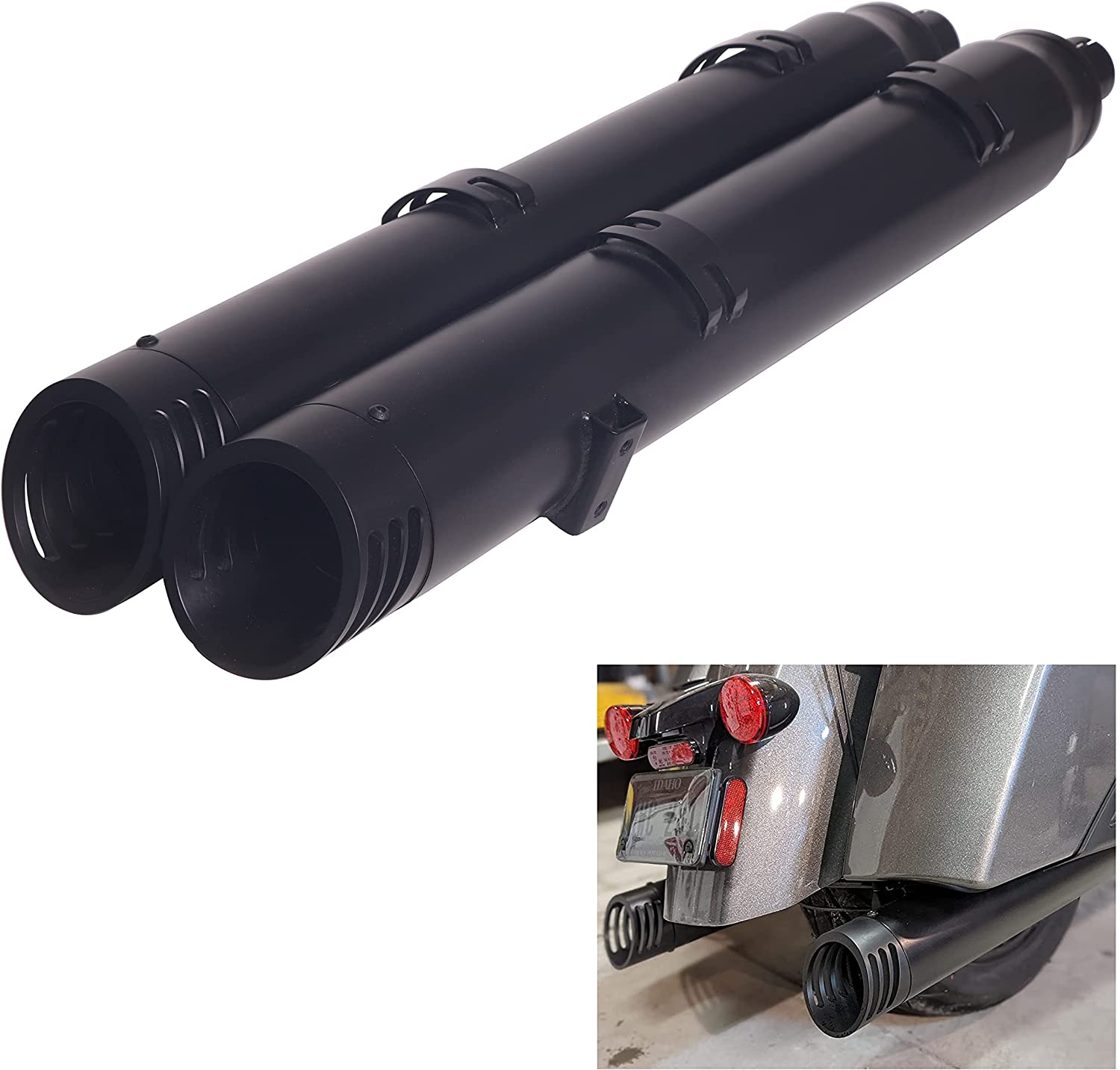
This one works perfecty for the following models: Chief, Chieftain, Roadmaster, Springfield, and Challenger. Its automatic laser welding keep the welding spots more solid, safe, and smooth. Hand made craft on polishing the pipe. You can get it at only US$339.00.
DraculeExtreme 4” Slip On Mufflers Exhaust for Indian 2014-2022 Chief Chieftain Roadmaster Springfield Challenger
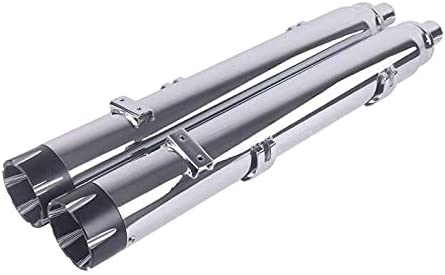
This one is designed for Indian Stock Header Pipe and it’s super easy to install by yourself. If you’re looking to get a good-looking and high-quality muffle for your machine, this is the perfect fit for you. You can get this one as low as US$319.00.
Sharkroad 4” Chrome Slip On Mufflers Exhaust Pipe for Harley Touring 2017-2022

This one is a perfect fit for 2017-2022 Harley Davidson Touring stock & aftermarket (Road King, Street Glide, Road Glide, Electra Glide Baggers, Triple Steps Mufflers). Amazing sound and extremely simple installation. They come with thorough directions and photographs in full color. Videos of them fall short. The sound of a Harley was intended to be like this! Get yours as low as US$249.00.
In addition, Revzilla has some of the best mufflers and exhausts, and you can get 10% Off Your First Order!
Always keep in mind that straight piping improves the appearance and sound of your motorcycle. There are several disadvantages to removing the muffler and catalytic converter, including the fact that it may be illegal in your state and void any manufacturer’s warranty remaining on your bike. Weigh the pros and cons before making the change on your bike.

